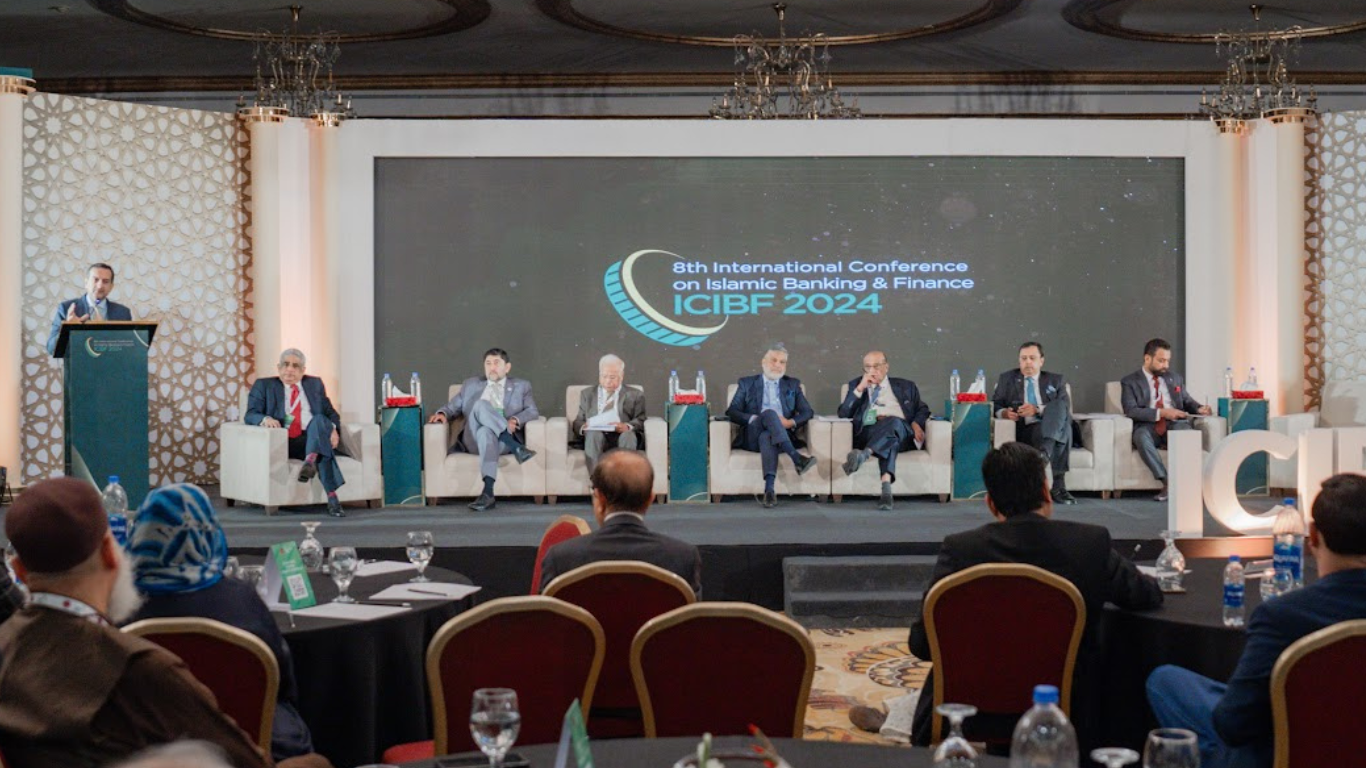
The Institute of Business Management (IoBM) successfully hosted the 8th International Conference on Islamic Banking and Finance (ICIBF 2024) from November 11 to 13, 2024. The event began with a pre-conference workshop on November 11, followed by the inaugural session on November 12 at a local hotel in Karachi. The conference was organized by IoBM's Centre for Islamic Business & Finance (CIBF) in collaboration with the Department of Accounting and Finance.
The Chief Guest, Mr. Saleem Ullah, Deputy Governor of the State Bank of Pakistan (SBP), delivered a keynote address emphasizing the importance of embracing a truly Islamic financial system. “While the focus has been on offering Shariah-compliant alternatives to conventional banking products, we must go beyond that. We need to provide a genuine Shariah alternative,” he stated, stressing the need for a comprehensive transformation of the banking ecosystem to achieve a true Islamic economic system. He called for a fair, just, and equitable system that requires collaborative efforts from all stakeholders.
The inaugural session also featured distinguished speakers, including Mr. Talib Karim, President of IoBM; Mr. Bashir Janmohammad, Chancellor of IoBM; Dr. Ishrat Husain, Former Governor of SBP; Mr. Rizwan Ata, CEO & President of BankIslami Pakistan Limited; Mr. Yousaf Hussain, President & CEO of Faysal Bank; and Syed Amir Ali, Deputy CEO of Meezan Bank Limited. IoBM's Rector, Deans, management, and faculty members were among the attendees.
In his welcome address, IoBM President Mr. Talib Karim stated, "As an educational institution, it is our responsibility to guide students, our future leaders, towards transforming financial institutions from traditional to Islamic models." He noted that a significant challenge lies in addressing the shortage of skilled manpower within the Islamic finance sector.
ICIBF 2024 gathered presidents, CEOs, financial experts, and policymakers from Pakistan's banking and finance sectors to discuss the future of the industry in light of the Islamic banking mandate. A significant topic at the conference was the recent constitutional amendment requiring the elimination of all forms of Riba (interest) from banks by 2028—a change that, according to Dr. Ishrat Husain, calls for a major disruption in the industry. Dr. Husain warned against a siloed approach among authorities, stressing that such an approach could undermine the core principles of Islamic banking. He also highlighted the challenges posed by the current tax system, which he described as arbitrary and regressive, and called for reform to curb evasion and malpractices.
ICIBF 2024 provided a platform for scholars, practitioners, and policymakers to discuss trends, challenges, and opportunities in Islamic finance. International speakers from Malaysia, Bahrain, the USA, Australia, the UK, and Saudi Arabia participated both in person and online, contributing valuable perspectives to the discussions. The Master of Ceremonies for ICIBF's inaugural session was Ms. Juveria Baig, HoD International Office & Placements, IoBM.
During the closing ceremony held on November 13, 2024, Mr. Talib Karim remarked, “As we conclude the 8th International Conference on Islamic Banking and Finance, it is truly inspiring to witness this flagship event expand once again, enriched by a diverse array of speakers and a wide range of pertinent topics. This year’s conference was especially timely, as Pakistan’s banking industry approaches the pivotal 2028 milestone for a complete transition from conventional to Islamic banking.” He further emphasized, “The role of educational institutions like IoBM in this transition is crucial. We are dedicated to preparing a workforce equipped to tackle the unique challenges and seize the opportunities presented by Islamic banking. To support this mission, we are enhancing our curriculum to more comprehensively integrate Islamic Banking and Finance, while also offering specialized certifications in this field.” The primary aim of the ICIBF has been to raise awareness and foster collaboration among scholars and researchers to share best practices that advance the discipline. Furthermore, we recognize that the Sustainable Development Goals (SDGs) align closely with Islamic values, and we will continue to weave these principles into our Islamic finance education.
IoBM President Mr. Talib Karim expressed heartfelt gratitude, extending sincere appreciation to Dr. Imam Uddin for his dedication to making the conference a success. He acknowledged the invaluable support of Rector Prof. Dr. Tariq Rahim Soomro; Dr. Muhammad Kashif, Dean CBM, IoBM; as well as the Deans of CCSIS, CESD, and the Accounting and Finance Department. He also recognized the essential contributions from the MARCOM, General Administration, and Housekeeping teams, and thanked the student volunteers for their enthusiastic and dedicated efforts throughout the event. He affirmed their shared commitment to equipping students with the knowledge necessary to shape a more equitable and sustainable future through Islamic banking and finance.